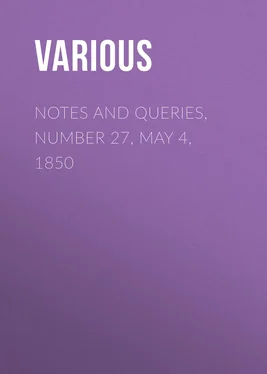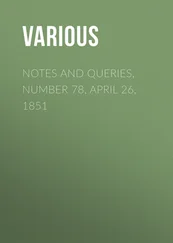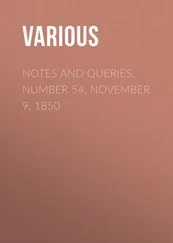Various - Notes and Queries, Number 27, May 4, 1850
Здесь есть возможность читать онлайн «Various - Notes and Queries, Number 27, May 4, 1850» — ознакомительный отрывок электронной книги совершенно бесплатно, а после прочтения отрывка купить полную версию. В некоторых случаях можно слушать аудио, скачать через торрент в формате fb2 и присутствует краткое содержание. Жанр: foreign_antique, periodic, foreign_edu, на английском языке. Описание произведения, (предисловие) а так же отзывы посетителей доступны на портале библиотеки ЛибКат.
- Название:Notes and Queries, Number 27, May 4, 1850
- Автор:
- Жанр:
- Год:неизвестен
- ISBN:нет данных
- Рейтинг книги:4 / 5. Голосов: 1
-
Избранное:Добавить в избранное
- Отзывы:
-
Ваша оценка:
- 80
- 1
- 2
- 3
- 4
- 5
Notes and Queries, Number 27, May 4, 1850: краткое содержание, описание и аннотация
Предлагаем к чтению аннотацию, описание, краткое содержание или предисловие (зависит от того, что написал сам автор книги «Notes and Queries, Number 27, May 4, 1850»). Если вы не нашли необходимую информацию о книге — напишите в комментариях, мы постараемся отыскать её.
Notes and Queries, Number 27, May 4, 1850 — читать онлайн ознакомительный отрывок
Ниже представлен текст книги, разбитый по страницам. Система сохранения места последней прочитанной страницы, позволяет с удобством читать онлайн бесплатно книгу «Notes and Queries, Number 27, May 4, 1850», без необходимости каждый раз заново искать на чём Вы остановились. Поставьте закладку, и сможете в любой момент перейти на страницу, на которой закончили чтение.
Интервал:
Закладка:
Various
Notes and Queries, Number 27, May 4, 1850
THE MOSQUITO COUNTRY.—ORIGIN OF THE NAME.—EARLY CONNECTION OF THE MOSQUITO INDIANS WITH THE ENGLISH
The subject of the Mosquito country has lately acquired a general interest. I am anxious to insert the following "Notes and Queries" in your useful periodical, hoping thus to elicit additional information, or to assist other inquirers.
1. As to the origin of the name. I believe it to be probably derived from an native name of a tribe of Indians in that part of America. The Spanish Central Americans speak of Moscos . Juarros, A Spanish Central American author, in his History of Guatemala , names the Moscos among other Indians inhabiting the north-eastern corner of that tract of country now called Mosquito : and in the "Mosquito Correspondence" laid before Parliament in 1848, the inhabitants of Mosquito are called Moscos in the Spanish state-papers.
How and when would Mosco have become Mosquito ? Was it a Spanish elongation of the name, or an English corruption? In the former case, it would probably have been another name of the people: in the latter, probably a name given to the part of the coast near which the Moscos lived.
The form Mosquito , or Moskito , or Muskito , (as the word is variously spelt in our old books), is doubtless as old as the earliest English intercourse with the Indians of the Mosquito coast; and that may be as far back as about 1630: it is certainly as far back as 1650.
If the name came from the synonymous insect, would it have been given by the Spaniards or the English? Mosquito is the Spanish diminutive name of a fly: but what we call a mosquito, the Spaniards in Central America call by another name, sanchujo . The Spaniards had very little connexion at any time with the Mosquito Indians; and as mosquitoes are not more abundant on their parts of the coast than on other parts, or in the interior, where the Spaniards settled, there would have been no reason for their giving the name on account of insects. Nor, indeed, would the English, who went to the coast from Jamaica, or other West India Islands, where mosquitoes are quite as abundant, have had any such reason either. At Bluefields where the writer has resided, which was one of the first places on the Mosquito coast frequented by English, and which derives its name from an old English buccaneer, there are no mosquitoes at all. At Grey Town, at the mouth of the river San Juan, there are plenty; but not more than in Jamaica, or in the towns of the interior state of Nicaragua. However names are not always given so as to be argument-proof.
How did the word mosquito come into our language? From the Spanish, Portuguese, or Italian? How old is it with us? Todd adds the word Muskitto , or Musquitto , to Johnson's Dictionary ; and gives an example from Purchas's Pilgrimage (1617), where the word is spelt more like the Italian form:—"They paint themselves to keep off the muskitas."
There is a passage in Southey's Omniana (vol. i. p. 21.) giving an account of a curious custom among the Mozcas, a tribe of New Granada: his authority is Hist. del Nuevo Reyno de Granada , l. i. c. 4. These are some way south of the other Moscos, but it is probably the same word.
One of the Virgin Islands in the West Indies has the name of Mosquito.
Some "Mosquito Kays" are laid down on the chart off Cape Gracias à Dios, on the Mosquito coast; but these probably would have been named from the Mosquito Indians of the continent. And these Mosquito Indians appear to have spread themselves from Cape Gracias à Dios.
It is stated, however, in Strangeways' Account of the Mosquito Shore , (not a work of authority), that these Mosquito Kays give the name to the country:—
"This country, as is generally supposed, derives its name from a clustre of small islands or banks situated near its coasts, and called the Mosquitos ."
I should be glad if these Notes and Queries would bring assistance to settle the origin of the name of the Mosquito country from some of your correspondents who are learned in the history of Spanish conquest and English enterprise in that part of America, or who may have attended to the languages of the American Indians.
2. I propose to jot down a few Notes as to the early connexion between the English and the Mosquito Indians, and shall be thankful for references to additional sources of information.
I have read somewhere, that a Mosquito king, or prince, was brought to England in Charles I.'s reign by Richard Earl of Warwick, who had commanded a ship in the West Indies; but I forget where I read it. I remember, however, that no authority was given for the statement. Can any of your readers give me information about this?
Dampier mentions a party of English who, about the year 1654, ascended the Cape River (the mouth of which is at Cape Gracias à Dios) to Segovia, a Spanish town in the interior; and another party of English and French who, after the year 1684, when he was in these parts, crossed from the Pacific to the Atlantic, descending the Cape River. (Harris's Collection of Voyages , vol. i. p. 92.) Are there any accounts of these expeditions?
Dampier also speaks of a confederacy having been formed between a party of English under a Captain Wright and the San Blas Indians of Darien, which was brought about by Captain Wright's taking two San Blas boys to be educated "in the country of the Moskitoes," and afterwards faithfully restoring them, and which opened to the English the way by land to the Pacific Sea. (Harris, vol. i. p. 97.) Are there any accounts of English travellers by this way, which would be in the very part of the isthmus of which Humboldt has lately recommended a careful survey? (See Aspects of Nature , Sabine's translation.)
Esquemeling, in his History of the Buccaneers , of whom he was one, says that in 1671 many of the Indians at Cape Gracias spoke English and French from their intercourse with the pirates. He gives a curious and not very intelligible account of Cape Gracias, as an island of about thirty leagues round (formed, I suppose, by rivers and the sea), containing about 1600 or 1700 persons, who have no king; (this is quite at variance with all other accounts of the Mosquito Indians of Cape Gracias); and having, he proceeds to say, no correspondence with the neighbouring islands. (I cannot explain this; there is certainly no island ninety miles in circumference at sea near Cape Gracias.)
A quarto volume published by Cadell in 1789, entitled The Case of His Majesty's Subjects having Property in and lately established upon the Mosquito Shore , gives the fullest account of the early connexion between the Mosquito Indians and the English. The writer says that Jeremy, king of the Mosquitos, in Charles II.'s reign, after formally ceding his country to officers sent to him by the Governor of Jamaica to receive the cession, went to Jamaica, and thence to England, where he was generously received by Charles II., "who had him often with him in his private parties of pleasure, admired his activity, strength, and manly accomplishments; and not only defrayed every expense, but loaded him with presents." Is there any notice of this visit in any of our numerous memoirs and diaries of Charles II.'s reign?
A curious tract, printed in the sixth volume of Churchill's Voyages , "The Mosquito Indian and his Golden River, being a familiar Description of the Mosquito Kingdom, &c., written in or about the Year 1699 by M.W.," from which Southey drew some touches of Indian manners for his "Madoc," speaks of another King Jeremy, son of the previous one; who, it is said, esteemed himself a subject of the King of England, and had visited the Duke of Albemarle in Jamaica. His father had been carried to England, and received from the King of England a crown and commission. The writer of this account says that the Mosquito Indians generally esteem themselves English:—
Читать дальшеИнтервал:
Закладка:
Похожие книги на «Notes and Queries, Number 27, May 4, 1850»
Представляем Вашему вниманию похожие книги на «Notes and Queries, Number 27, May 4, 1850» списком для выбора. Мы отобрали схожую по названию и смыслу литературу в надежде предоставить читателям больше вариантов отыскать новые, интересные, ещё непрочитанные произведения.
Обсуждение, отзывы о книге «Notes and Queries, Number 27, May 4, 1850» и просто собственные мнения читателей. Оставьте ваши комментарии, напишите, что Вы думаете о произведении, его смысле или главных героях. Укажите что конкретно понравилось, а что нет, и почему Вы так считаете.












